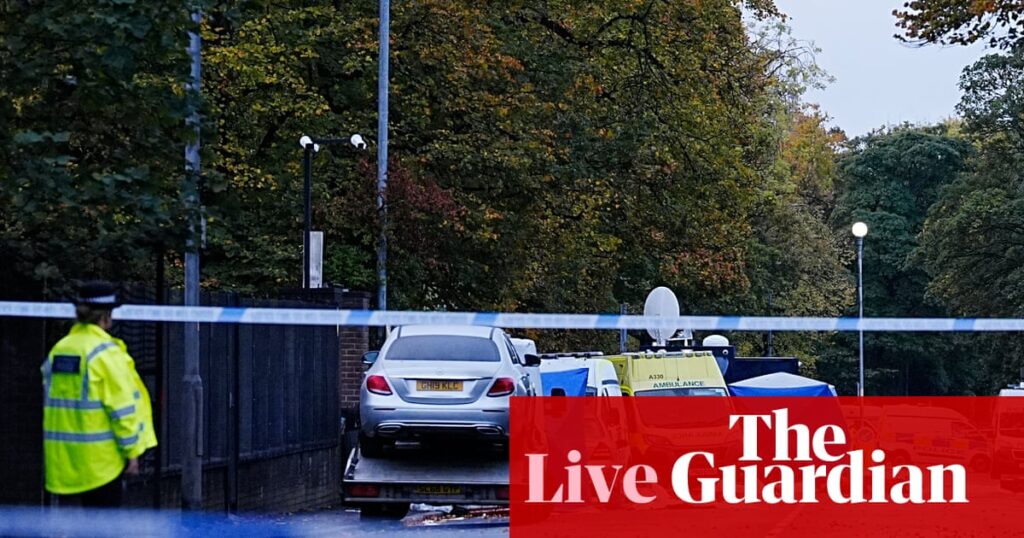Manchester synagogue attack victims named
The two men killed in Thursday’s attack on a synagogue in Manchester have been named as 53-year-old Adrian Daulby and 66-year-old Melvin Cravitz, police have said.
Greater Manchester police said formal identification is yet to take place but their families have been informed and family liaison officers are in contact.
The men were killed when an attacker used a car to ram into the grounds of the Heaton Park Hebrew Congregation synagogue in Crumpsall, then stabbed worshippers in a six-minute rampage that only ended when armed officers shot at him twice.
Three others were seriously injured in the attack on Yom Kippur, the holiest day in the Jewish calendar.
Police named the attacker on Thursday night as Jihad al-Shamie, 35, a British citizen of Syrian descent. Greater Manchester police revealed that three other people – two men in their 30s and a woman in her 60s – had been arrested “on suspicion of commission, preparation and instigation of acts of terrorism”.
Postmortem examinations of the victims – both of whom are from Crumpsall – will take place later on Friday.
We’ll bring you the latest developments on this story as we get them.
Key events
We’ve got a bit more from the chief rabbi, who said so many people in the Jewish community “and well beyond it” wonder why marches in support of Palestine Action are allowed to take place.
He told BBC Radio 4’s Today programme:
Some of them contain outright antisemitism, outright support for Hamas. Not every single person, however there is so much of this, which certainly is dangerous to many within our society.
You cannot separate the words on our streets, the actions of people in this way, and what inevitably results, which was yesterday’s terrorist attack.
The two are directly linked and therefore we call on the government yet again, we’ve been doing so continuously, and yet again we say get a grip on these demonstrations, they are dangerous.
Chief rabbi criticises ‘unrelenting wave of hatred against Jews’
Chief rabbi Sir Ephraim Mirvis said this is a “very dark time” ahead of visiting Manchester, as he referred to an “unrelenting wave of hatred against Jews”.
Speaking to BBC Radio 4’s Today programme, he said:
Right now, our hearts are shattered. What transpired yesterday was an awful blow to us, something which actually we were fearing might happen because of the build up to this action.
I’m going to be arriving in Manchester early this morning, together with my wife, in order to be with a grieving community, and this is a very dark time, not just for Jews of Britain but for all of our society because this wasn’t merely an attack against Jews, it was an attack against the values of our society.
The chief rabbi added:
We have witnessed an unrelenting wave of hatred against Jews being expressed on our streets, on campuses, right across social media and some of the media.
And in addition to that, when there is the unjustified demonisation of Israel, that feeds directly into an anti-Jewish sentiment within the tone of Britain, and that then encourages extremism.
Our government needs to be mindful of that.
As my colleague Chris Osuh has reported, feelings of safety in the UK’s Jewish community have declined sharply in the last couple of years, according to the largest survey of British Jews since 7 October 2023.
Speaking to LBC, the home secretary says antisemitism has been “rising” in the UK.
Asked about comments made by Israel foreign minister Gideon Sa’ar that the UK government is failing to curb “rampant antisemitic and anti-Israeli incitement in Britain”, she said:
Myself and the prime minister both acknowledge that antisemitism in our country has been rising.
It is completely unacceptable, and we both condemn it utterly. We will not stand for it.
We have strong laws in our country against incitement to racial hatred.
Too early to say if terrorist cell behind the attack, home secretary says
Mahmood’s next stop is BBC Breakfast. She is asked if a terrorist cell is behind the attack.
It’s too early to say that yet. Arrests have been made and the police investigation is continuing at pace.
We will, of course, provide more information as that comes in from the police, but I think it’s important we don’t get ahead of what we know as the basic facts of what has happened.
Next on Sky news, Mahmood is asked about the pro-Palestine marches that took place late on Thursday. She said:
I was very disappointed to see those protests go ahead last night.
I think that behaviour is fundamentally un-British. I think it’s dishonourable.
I would have wanted those individuals to just take a step back.
The issues that are driving those protests have been going on now for some time; they don’t look like they’re going to come to an end any day soon.
They could have stepped back and just given a community that has suffered deep loss just a day or two to process what has happened and to carry on with the grieving process.
Earlier on her morning media round, the home secretary said the attacker was not known to police. She’s faced a similar line of questioning on Sky News, where she was asked whether he had been referred to the anti-terror Prevent programme.
As you would expect considering he was not known to police, she says he had not.
Home secretary denies the recognition of Palestine has emboldened antisemites
Next up for the home secretary is Times Radio, on which she denied recognising Palestine had emboldened those who are antisemitic.
Mahmood said:
The only person responsible for this devastating attack on our Jewish community is the attacker himself.
The police have made three additional arrests, and it’s important that they are allowed to continue with their investigations and our process of justice is allowed to take its course. That is separate to what is happening in the Middle East.
The work of this government since the day we were elected has been to put our shoulder to the wheel in the diplomatic efforts in difficult and delicate conversations that are designed to try and bring an end to that devastating war.
Far too many lives have been lost. We want to see a secure and safe state of Israel alongside a state of Palestine.
Home secretary urges people to ‘step back from protesting for at least a few days’
The home secretary has urged pro-Palestine protesters not to carry out demonstrations in the wake of the terror attack in Greater Manchester.
Speaking on GB News, Mahmood said:
As far as I am concerned, I would have wanted to see people in this country step back from protesting for at least a few days, just to give the Jewish community here a chance to process what has happened and to begin the grieving process as well.
I am very disappointed that some of the organisers haven’t heeded the call to step back.
I would still call on people to show some love and some solidarity to the families of those who have been murdered and to our Jewish community.
Attacker was not known to police, home secretary says
The man who carried out the attack in Greater Manchester was not known to the police, the home secretary has confirmed.
Speaking on GB News as part of her morning media round, Shabana Mahmood said:
In terms of the attacker, this individual was not known to the security services.
He has obviously been shot dead at the scene, but the police investigations will now continue at pace.
She thanked members of the Heaton Park Hebrew Congregation Synagogue in Crumpsall and the police, saying their actions helped save lives.
Six minutes of terror: how Manchester synagogue attack unfolded

Josh Halliday
Worshippers had arrived early for a special morning service at Heaton Park shul in north Manchester. It was Yom Kippur, the holiest day in the Jewish calendar, and rabbi Daniel Walker was leading prayers in his long white robes. By 9.31am, they were stained with blood.
Here, our North of England editor Josh Halliday explains how the attack unfolded:
Analysis: MI5 and counter-terror police on heightened alert

Dan Sabbagh
MI5 and counter-terrorism police will operate at a heightened state of alert in the coming weeks, reflecting concern that the Manchester synagogue attack may be followed by others during the period around the second anniversary of the 7 October attack by Hamas on Israel.
Policing at synagogues across the country is to be increased. The London mayor, Sadiq Khan, promised “high visibility” patrols in and outside Jewish places of worship to reassure communities and to deter any further threats, while police forces elsewhere in the UK made similar commitments.
Investigations into the attack, which killed two and seriously injured four others, remain at an early stage. The central theory is that the killer, who was shot dead by police, had an Islamist motivation. There is no information in the public domain about whether he may have been radicalised by the continued Israeli military campaign and deaths of Palestinians in Gaza.
The attack, at about 9.30am at the Heaton Park Hebrew Congregation synagogue in Crumpsall, Manchester, was not sophisticated.
There were concerns the attacker was carrying an explosive and appeared to have a vest and items strapped to his waist, but the devices were fakes. Victims at the synagogue, who were marking the last day of Yom Kippur, were stabbed with a knife.
A key line of inquiry for investigators is whether the attacker acted alone, though there is not thought to be any ongoing threat to the public.
Plots directed from overseas, once the norm in the era of al-Qaida, have become rare and individuals are more usually radicalised by following the news or gaining information online.
Investigators also acknowledged that the two-year Israel-Gaza war has changed the threat environment.
Two years ago, Ken McCallum, the head of MI5, said: “There clearly is the possibility that profound events in the Middle East will either generate more volume of UK threat, and/or change its shape in terms of what is being targeted, in terms of how people are taking inspiration.”
Read more here:
This is the scene in Crumpsall on Friday morning:

Chris Osuh
Feelings of safety in the UK’s Jewish community have declined sharply in the last couple of years, according to the largest survey of British Jews since 7 October 2023.
The research, conducted in June and July, found 35% of Jews felt unsafe in Britain in 2025, compared with 9% in 2023 before the Hamas attacks.
Perceptions of antisemitism had also intensified, with 47% of British Jews seeing it as a “very big” problem – up from just 11% in 2012.
The research, conducted by the Institute for Jewish Policy Research (JPR), also found 32% of Jews reported experiencing at least one antisemitic incident in 2024.
Meanwhile, the Community Security Trust (CST), which has been monitoring antisemitic incidents since 1994, recorded 1,521 cases in the UK from January to June 2025.
This was the second-highest total ever recorded in the first half of any year, second only to the first six months of 2024 with 2,019 in the immediate aftermath of the 7 October atrocity.
Of the 1,521 antisemitic incidents this year, 968 occurred across Greater London and Greater Manchester, the two UK cities with the biggest Jewish populations.
The new report from the JPR examined how British Jews are navigating “a period of profound challenge and instability”.
It found emotional attachment to Israel had increased – with 75% of British Jews feeling emotionally attached and 49% “very attached”, compared with 72% and 40% respectively just before 7 October.
However, it also found “anti-Zionist identification” had risen from 8% in 2022 to 12% in 2025, most notably among younger Jews, with a quarter (24%) of 20- to 29-year-olds now identifying as anti-Zionist, a rise from 13% in 2022.
Here’s a map showing where the attack took place:
Thursday’s attack drew widespread condemnation from across the political spectrum, with Keir Starmer calling the knife attacker a “vile individual” who “attacked Jews because they are Jews, and attacked Britain because of our values”. Political rivals Kemi Badenoch and Nigel Farage were among those joining the prime minister in showing support for the Jewish community.
It happened days before the second anniversary of the 7 October attacks by Hamas in Israel. Police said there would be heightened security at synagogues and Jewish community centres in coming days. Research published on Thursday showed that more than a third (35%) of British Jews said they felt unsafe in the UK, compared with 9% before the 7 October attacks.
The Board of Deputies and the Jewish Leadership Council said in a statement on Thursday evening that the attack was “sadly something we feared was coming”.
They added: “We call on all those in positions of power and influence to take the required action to combat hatred against Jewish people, and will be working with the authorities on a series of additional measures to protect our community over the coming days.”
You can reas our full report from yesterday here:
Naming the victims, Detective Ch Supt Lewis Hughes, who is coordinating the casualty response, said:
My deepest sympathies are with Mr Daulby and Mr Cravitz’s loved ones at this extremely hard time.
Specially trained family liaison officers are in contact with them. They will continue to update them on the investigation and support them throughout the coronial process
While there are processes which must be followed, we commit to being mindful of cultural preferences and sensitivities and to ensuring that these men and their loved ones’ wishes are respected.
Manchester synagogue attack victims named
The two men killed in Thursday’s attack on a synagogue in Manchester have been named as 53-year-old Adrian Daulby and 66-year-old Melvin Cravitz, police have said.
Greater Manchester police said formal identification is yet to take place but their families have been informed and family liaison officers are in contact.
The men were killed when an attacker used a car to ram into the grounds of the Heaton Park Hebrew Congregation synagogue in Crumpsall, then stabbed worshippers in a six-minute rampage that only ended when armed officers shot at him twice.
Three others were seriously injured in the attack on Yom Kippur, the holiest day in the Jewish calendar.
Police named the attacker on Thursday night as Jihad al-Shamie, 35, a British citizen of Syrian descent. Greater Manchester police revealed that three other people – two men in their 30s and a woman in her 60s – had been arrested “on suspicion of commission, preparation and instigation of acts of terrorism”.
Postmortem examinations of the victims – both of whom are from Crumpsall – will take place later on Friday.
We’ll bring you the latest developments on this story as we get them.

